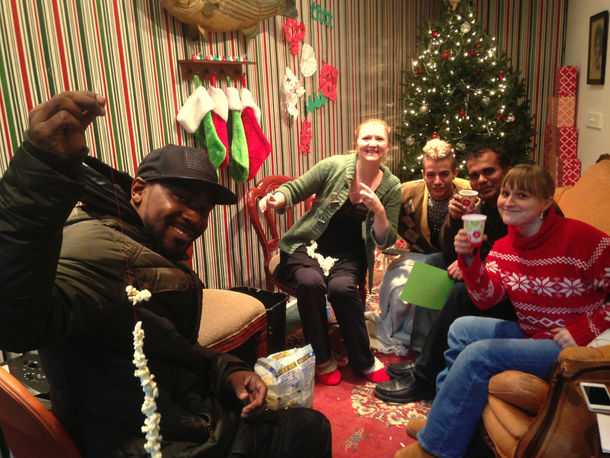Happiness Machine. (2014)
CREATED BY: JESS APPLEBAUM (dramaturg), NIC BENACERRAF (creative director), MARINA MCCLURE (director), CAMDEN PLACE (visual artist)
VENUE: Chashama Storefront, 37th St & 8th Avenue, NYC
SUMMARY: During the two weeks before Black Friday, Happiness Machine: The American Holiday Experience deployed holiday imagery in sublime excess -- a little too early for full-on holiday cheer. Located in a midtown Manhattan storefront, but with an uncanny absence of commercial activity, our mission was to highlight the arbitrary way that family imagery gets lathered onto advertisements at the end of each year.
THE INVITATION: The store offered refuge to weary shoppers, traveling families, and other passersby. People were invited into the free storefront by an “employee” who stood on the street
handing out hot chocolate and coffee. When guests entered, there was a multiracial American “family” waiting to welcome them as their own.
CENTRAL QUESTIONS:
-
How does family imagery get applied, almost arbitrarily, onto advertisements during the holiday season?
-
How can we bring critical attention to this technique?
-
How can we appropriate the techniques of Public Relations while also critiquing them?
THE “FRONT”: Our storefront sold and packaged holiday cheer, but without any product, or money exchanged. Guests were informed that “Happiness Machine” was a nonprofit company dedicated to motivating the American consumer so that US corporations would have their “most successful Black Friday ever”. All guests were welcomed into the storefront by an “American family”, a multiracial group of actors who treated guests with warmth and familiarity and were encouraged to put on ugly holiday sweaters. They could "practice" various quintessential activities -- present-wrapping, tree decorating, party games -- inside a “model” Christmas living room.
THE REVERSAL: Whenever guests decided to leave, they were offered the opportunity to purchase a special present, wrapped just for them, and labeled with an intangible experience that
we could never reasonably sell them (e.g., for someone who was eager for mundane home improvement activities, we would offer “30 minutes in the workshop with Dad”). We sold these personalized/abstracted presents to about half of our guests, for prices ranging between $2 and $20. Later, they would discover that the box contained nothing but a press release outlining the project’s intentions.
In the process, we were surprised to find sincere community with New Yorkers of all stripes, some of whom felt safe enough to stay for hours, and some of whom returned repeatedly as “volunteers”.
COMPONENTS










